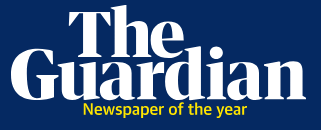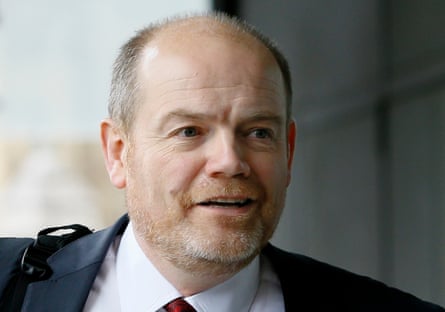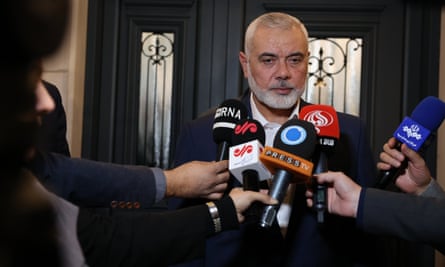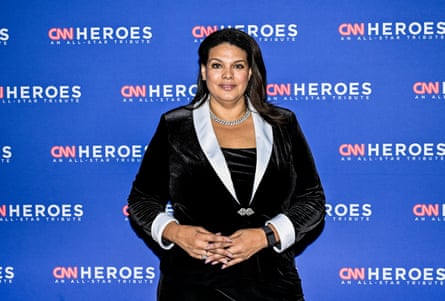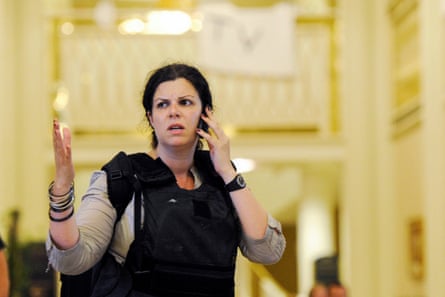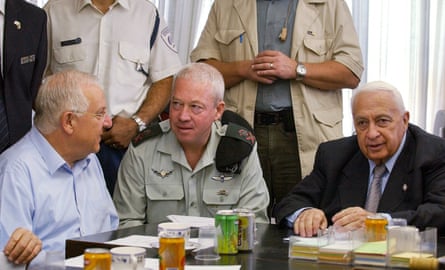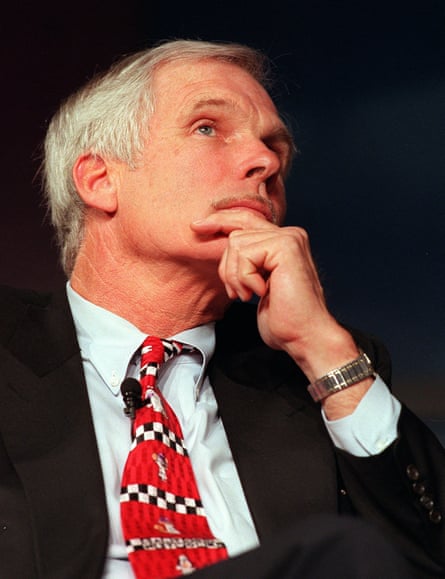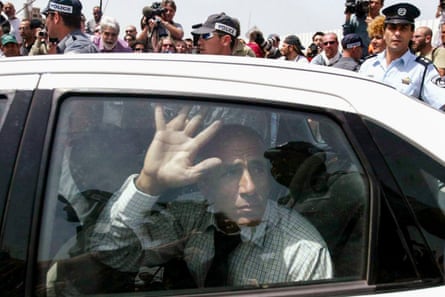Guardian’s Editor-in-Chief caves to pro-Israel pressure

JVL Introduction
In a brilliant piece of investigative journalism, Novara Media reporter Rivkah Brown reports on why the Guardian has positioned itself ever-so cautiously in its coverage of the war on Gaza.
The Editor-in-Chief, Kath Viner, has a decisive influence on the overall balance of the Guardian’s’ reporting and, argues Brown, is overly influenced by the paper’s pro-Israel detractors.
While Viner’s predecessor Alan Rushbridger’s attitude to them was distanced scepticism, “Viner’s, say colleagues, is ingratiating… The result… is a reactive commissioning strategy focused on appeasement.”
Since October 7th Viner has increased her supervisory role, with every opinion piece about Israel and Palestine going to her for sign-off. The result is that the Guardian’s comment pages “have come to reflect its editor’s susceptibility to criticism”.
Brown shows in some detail how this has worked out in practice.
A must-read article.
RK
This article was originally published by Novara Media on Tue 12 Mar 2024. Read the original here.
How the Guardian’s Editor-in-Chief Caved to Pro-Israel Pressure
‘Kath takes the Board of Deputies very seriously.’
On 8 November, the Guardian held its daily editorial conference at its offices in King’s Cross, north London. The 10am conference is intended as a forum to discuss current events and internal paper dynamics in a more discursive way than in the 9am morning meeting, in which heads of section run through the day’s publishing schedule. While all staff can attend, speakers tend to be more senior or ambitious journalists.
The meeting had only recently been phased back in, having moved online then stopped altogether during the pandemic. Some blamed practicality; others, editor-in-chief Katharine Viner’s well-known conflict aversion. Longtime staffers say that under previous editors, conference was free-flowing and fractious; disagreement was welcomed, even encouraged. When it migrated online, it was given pre-set themes, placing guardrails on the discussion that have been maintained since the meetings resumed in person. The conference on 8 November was something of a throwback.
In it, several staffers recall Joseph Harker – founder of the weekly newspaper Black Briton and one of the first Black journalists to be hired by the Guardian, now its senior editor of diversity and development – sharing his understanding of the situation in Israel and Palestine. People of colour, Harker told a roomful of mostly white faces, were paying close attention to how the media was covering the events following 7 October, and to who was lining up behind whom.
There were multiple levels on which the latest conflagration could be understood, said Harker. One was as the latest episode in a decades-long conflict between Israel and Palestine. Another was as part of a globalised system of racial supremacy – and the Guardian’s coverage of the war might give the impression that only white lives mattered. Another staff member, also not white, voiced their agreement. Jonathan Freedland spoke next.
Freedland is the Guardian’s resident liberal Zionist, occupying the rightmost pole of the paper’s regular commentary on Israel and the leftmost at his other journalistic home, the Jewish Chronicle. Freedland is arguably the Guardian’s most senior opinion journalist; one of former Guardian editor Alan Rusbridger’s favourite sons, Freedland was briefly tipped to succeed him. His response to Harker suggested he had oversimplified the racial dynamics at play. To describe Israeli Jews as “white” was inaccurate, Freedland said, since at least half of Israel’s Jewish population is Mizrachi (Middle Eastern and north African) or Ethiopian.
Silent throughout this tête-à-tête was the meeting’s chair and the paper’s editor-in-chief. It wasn’t unusual for editors to absent themselves from such debates; Rusbridger certainly had. To those familiar with Viner’s professional trajectory, however, it was hard to believe she didn’t have a view. “The Palestinians have always known that they are the racial underclass,” a 29-year-old Viner wrote in 2000 for the paper she would later run, “but the overwhelmingly unequal nature of the conflict is so often left out of the peace equation.”
Back then, Viner wasn’t just a twenty-something who’d read Frantz Fanon: Palestine was a cause close to her heart. According to the Press Gazette, as a young woman she’d spent so much of her holidays in “places like Lebanon, Syria, Israel and the West Bank” that her brother had dubbed her a “trauma tourist”.
In 2005, five years after her fiery Guardian op-ed, Viner – then editor of the Guardian’s Weekend magazine – was invited to write a play with the actor Alan Rickman based on the diaries of Rachel Corrie, a woman Viner described as a “devastatingly prescient” 23-year-old American peace activist crushed to death by an Israeli bulldozer in Gaza. My Name is Rachel Corrie received glowing reviews at the Royal Court, and was restaged at the Young Vic 12 years later. By this point, however, the playwright had outgrown her youthful zealotry.
For having started her career as an unflinching author-activist, someone who appeared to be centring her journalism on the Palestinian struggle, Viner has since ascended to one of the most powerful positions in global media. According to 13 current and former Guardian journalists who spoke to Novara Media, the ascent has changed her – and heavily inflected how a paper that sees itself as a beacon of British liberalism has covered “a textbook case of genocide”.
Vote Kath, Get Seumas.
When the contest to replace Rusbridger began in 2014, Viner emerged as the left candidate.
Rusbridger was widely seen as a journalist of the old-fashioned sort: driven more by a commitment to journalistic excellence than by anything as vulgar as political conviction. Among his would-be successors, Janine Gibson was perceived as more of the same, Ian Katz as marginally more rightwing.
Viner, by contrast, was more closely associated with the paper’s leftwing coterie alongside Gary Younge and (former opinion editor turned Corbyn spin doctor) Seumas Milne – though she was also something of an unknown quantity to many in the UK office, having spent the preceding two years in Sydney and New York.
While the Guardian’s editor-in-chief is technically chosen by the Scott Trust – the company that owns both the Guardian and the Observer – the selection process is strongly influenced by an all-staff plebiscite first introduced in 1995, which Rusbridger won. Many of Viner’s colleagues voted for her hoping she would return the Guardian to the progressive principles from which it had drifted under Rusbridger. “I voted for Kath, and I know other people voted for Kath, out of a sense that she would take the Guardian back to its kind of liberal left values,” said one longtime staffer.
Others used Viner’s perceived leftism to undermine her. One former staffer remembers a smear slogan doing the rounds: “Vote Kath, get Seumas.”
[Sign up to The Pick: Novara Media’s best articles, every week, straight into your inbox]
The McCarthyite undercurrents within the editorial election campaign exacerbated Viner’s class anxieties. While also an Oxford alumna, Viner, the daughter of two teachers and head girl of her Yorkshire grammar school, lacked Rusbridger’s private-school aplomb. Rusbridger carried a vague air of entitlement; Viner, a nagging sense of unbelonging.
“I honestly thought journalism wasn’t for me,” Viner told the Press Gazette in 2005, “I thought it was for men in suits in London.” That belief appeared to follow her even as she broke the glass ceiling to become, in March 2015, the paper’s first woman editor-in-chief, with 53% of the first-choice votes.
In the fateful Labour leadership race that took place later that year, the paper backed Yvette Cooper, the shadow home secretary who had made a name for herself pushing tighter controls on immigration. Some situate the move – justified mainly on gender grounds – within a longstanding Guardian tradition of backing political duds (“Nick Clegg – the British Obama?” read one memorable headline published under Rusbridger).
To others, endorsing Cooper seemed Viner’s way of announcing she was not the leftist she was painted as. In the years following her appointment, the paper’s leftwing contingent continued to shrink, as its most influential members – including Viner’s former friends Milne and Younge – left, their relationships with Viner in tatters.
Meanwhile, Viner began paring back some of the riskier elements of the paper’s work, namely its reporting on the security services: a 2019 investigation by Declassified found that the Guardian published roughly 110 online articles a year about MI6 in the final two years of Rusbridger’s editorship; since Viner had taken over, the yearly average had halved and was continuing to decline.
It wasn’t wholly surprising that Viner lacked the stomach for this kind of journalism. Edward Snowden’s National Security Agency leaks hadn’t only won the Guardian Emmys and Pulitzers – it had also led GCHQ to order the destruction of a number of Guardian computers. Nevertheless, some felt Viner had overcorrected.
“Some … feel the company has become more risk averse [in the past year],” a “well-placed source” told the Press Gazette in May 2016, a year into Viner’s editorship.
If Viner’s inclination was towards caution in peacetime, it has become an article of faith since 7 October. The result, say staff, has been a series of kneejerk decisions, meticulous both-sidesism and increasingly unsubtle censorship, even as the situation in Gaza becomes increasingly clear-cut.
Placating the implacable.
“The Guardian has always been obsessed with the question of Israel-Palestine, carries a burden of guilt and responsibility for its part in its creation, and constantly seeks ways to get it right,” wrote Daphna Baram in her 2005 book Disenchantment: The Guardian and Israel.
The young British-Israeli journalist had approached Rusbridger and Guardian Books with her book pitch at just the right time. The second intifada was in full swing and so was Israel’s hasbara operation. Until then mostly concentrated in the US, it was during this period that pro-Israel lobbying began to entrench itself in the UK, with new outfits like the British Israel Communication and Research Centre (Bicom) and HonestReporting pushing legacy organisations such as the Board of Deputies of British Jews to focus on defending Israel’s interests abroad.
Criticism of the Guardian was mounting from this increasingly vocal and well-organised pro-Israel right, which saw the paper as overly, even antisemitically, critical of the Jewish state. Baram’s conclusion was intended as the final word on the matter: not only was the paper not antisemitic, it wasn’t even anti-Zionist.
In fact, showed Baram, the paper had played a decisive role in Israel’s foundation: Guardian founder CP Scott had been the one in 1915 to introduce early Zionist Chaim Weizmann to prime minister Lloyd George, who in turn had suggested a meeting with Arthur Balfour.
Though the love affair may have waned after the six-day war in 1967, when Israel began illegally occupying the West Bank, the Guardian nevertheless “clung … to the doveish tendency of the Israeli Labour party and refused to let go, even years after that tendency had vanished”. If anything, Baram concluded, the paper’s “combination of almost colonial white-man’s-burden commitment and deep-rooted liberal values” made it too soft on Israel.
Israel and Palestine “has always been … the quintessential issue where outside groups are hysterically policing what’s in the paper,” one senior Guardian staffer told Novara Media. Those who worked under Rusbridger recall a disproportionate amount of time being spent on the issue: in 2009, commissioning editor Brian Whitaker told journalist David Cronin that the paper’s comment section received more submissions about Palestine than on any other subject. Staff also recall that the paper expended a huge amount of energy firefighting criticism of its Israel and Palestine coverage: Milne was known to keep a tally of pro-Israel and pro-Palestine op-eds on his desk to demonstrate, if questioned, his unimpeachable fairness.
Central to Rusbridger’s editorial vision, journalists who worked for him say, was a commitment to pushing the boundaries of acceptable discourse on Israel and Palestine, in both directions. Rusbridger published pieces by far-right Israeli settlers, others with headlines such as “Israel simply has no right to exist” – both unthinkable under Viner. In 2002, the Guardian published an English translation of al-Qaeda founder Osama bin Laden’s Letter to America; the paper took it down in November 2023 after it went viral on TikTok. “Alan as an editor was to the right of Kath in his personal opinions,” one former Guardian staffer told Novara Media, “but he was also much more prepared to allow a wide range of different political views and approaches and … more confident as an editor.”
One of the paper’s most committed pro-Israel lobbyists is the Board of Deputies. The Board demanded to meet with Rusbridger within weeks of his appointment, reading him out a list of the Guardian’s recent offences. Its president Henry Grunwald returned in 2006 along with Gerald Ronson of the Community Security Trust to discuss a displeasing piece by then Middle East correspondent Chris McGreal comparing Israel to apartheid South Africa. The piece, Ronson said, was fuelling antisemitic violence. Rusbridger had little patience for his hysteria.
“I’m not sure how you make that causal connection between someone reading an article that is critical of the foreign policy of Israel and then thinking why don’t I go out and mug Jews on the streets of London,” he told openDemocracy in a subsequent interview. “I just can’t believe that happens.”
If Rusbridger’s attitude to the paper’s pro-Israel detractors is distanced scepticism, Viner’s, say colleagues, is ingratiating.
“Kath takes the Board of Deputies very seriously,” said one current Guardian staffer, “[and] read[s] the shit out of the rightwing press.”
The result, they say, is a reactive commissioning strategy focused on appeasement.
While the Guardian mostly consists of an archipelago of autonomous commissioning centres, and while the Guardian US and Australia have their own editors-in-chief (Lenore Taylor in Sydney, Betsy Reed, formerly of The Intercept, in New York), the UK editor tends to exercise considerable oversight of the paper’s global opinion output (news, less so). Since 7 October, Viner has increasingly centralised control.
Controversial op-eds routinely go to the editor-in-chief for sign-off – after 7 October, however, one columnist was told that every opinion piece about Israel and Palestine was to be okayed by Viner. The result is that the Guardian’s comment pages have come to reflect its editor’s susceptibility to criticism.
“We do as many good [opinion] pieces as we ever have [about Palestine],” said one current Guardian staffer, “but at the same time, you know, if we’re taking two steps forward, we’re then always taking one step back.
“It’s come to a point where every time we put out a really good piece, I am 100% certain that within a week, management will get spooked and through some mechanism” – never as explicit as Viner putting a piece on an editor’s desk – “another piece will arise that is the other side of that. … You can just play mix and match on the Guardian website.”
The staffer cites a pair of pieces published in October last year. The first was by the Israeli genocide scholar Raz Segal. The piece, which accused Israel of weaponising the Holocaust, prompted furious and public backlash from the Board of Deputies.
Six days later, the paper published a response from Karen Pollock – head of the Holocaust Educational Trust and a key combatant in Israel’s media war – attacking Segal’s argument with Israel’s favoured talking points, among them the assertion that Hamas “murdered and mutilated babies” – an apparent reference to the 40 beheaded babies claim, which the paper’s own Jerusalem correspondent has condemned as unevidenced – and the notion of Gazans as human shields. Staff with knowledge of the issue strongly suspect Pollock’s article came through Viner; it certainly went to her for sign-off.
“How have we got to the point of placating implacable people?” asked one senior Guardian journalist. “People arguing the toss, in bad faith.”
[We believe that the media should not kowtow to lobbyists. Thanks to our supporters, we don’t have to. Become a Novara Media supporter today.]
Some suggest Viner’s willingness to platform rightwingers like Pollock is understandable. After all, she has witnessed them successfully undermine the most prominent leftwinger in the country, and fears she could be next. “What they did to Corbyn they could do to Kath in a heartbeat,” one senior staff member told Novara Media.
Another long-serving staffer offered a similar explanation: “I think that the editorial leadership has become more cautious and to some degree more gun-shy.
“I think that’s partly because the pro-Israel lobby is more aggressive in the UK than it used to be, and forthright, and partly it’s a legacy of the Corbyn antisemitism issue. I think it also reflects, at times, a lack of confidence in aspects of the leadership.
“That said … I think during this whole Gaza thing … there’s been a real breadth of reporting and opinion that has appeared in the Guardian that hasn’t appeared elsewhere. So to some degree, I think that caution may be wise in the sense, they protect their back from us being skewered over the small things.”
A hostile environment.
It isn’t only external stakeholders Viner is feeling pressured to placate. Guardian journalists who spoke to Novara Media say that 7 October has heightened internal tensions that have been brewing for some time.
In November, one Guardian employee whose partner’s family lives on a southern Israeli kibbutz wrote anonymously in the Jewish News that they felt unsafe working at the paper. In one incident, they recall a colleague mocking an image of a burning Israeli flag. The Jewish News subsequently issued a correction to the piece, adding that the perpetrator was not a staff member but a visiting schoolchild.
The author, subsequently revealed to be Jane Prinsley, later quit as the Guardian’s education officer – a role that includes managing visits from school groups – to work as a reporter at the hard-right pro-Israel Jewish Chronicle.
Nevertheless, the poorly fact-checked piece became the basis of a series of further pieces that prompted Viner to silence one of the paper’s only prominent Black contributors.
Prinsley’s piece was followed by a flurry of articles about the Guardian in the Jewish News, a paper marginally to the left of the Jewish Chronicle but still staunchly supportive of Israel. The coverage focused almost exclusively on one journalist referred to in Prinsley’s piece, though not by name: Chanté Joseph, the Black woman host of the Guardian’s Pop Culture podcast.
Joseph, the Jewish News alleged, had retweeted an X/Twitter account deemed to be “pro-Hamas” for its inclusion of paraglider emojis in its handle. Joseph removed the offending posts and issued an apology – but it was too late. Viner paused Joseph’s podcast and hasn’t returned it since (a Guardian spokesperson confirmed that “Chanté Joseph is the presenter of the Pop Culture podcast, which is currently taking a break”).
Meanwhile, more concerted efforts to apply pressure internally were in motion. Among the paper’s identity-based staff groups – LGBTQ+, Gopoc (Guardian and Observer People of Colour) – is an emergent Jewish group, which came together after 7 October in what some such as Prinsley felt was an increasingly embattled internal environment.
Like the paper’s other staff groups, the Jewish group is an informal association that exists not only to provide a social forum for its members, but also to advance their interests within the paper – in its case, to curb the paper’s anti-Israel excesses and raise awareness about Israel-related antisemitism. In November, the group met with Viner to discuss the paper’s coverage of the war. Since the meeting, Jewish staff group members have circulated a large number of article ideas and pre-written pieces in the hope of catching Viner and the opinion desk’s attention.
One such piece was written by an anonymous student at Oxford University. In it, the student describes an explosion of campus antisemitism, citing the slogan “From the river to the sea” as “a dog-whistle for getting rid of Jews”. It also relates how “an Israeli student whose relatives were murdered at the Nova festival [told] me she felt safer [in Israel] than on campus”.
Staff say they are confused about how the piece made the cut, given its anonymity (the paper does offer anonymous bylines, though rarely on such loaded topics as campus antisemitism, one of the current causes célèbres of the culture war) and weak argumentation. Viner declined to comment on any of the questions put to her by Novara Media, including if she was involved in the decision to commission the piece.
Other groups have found it far harder to get a hearing with the editor-in-chief. In December, Gopoc had its own meeting with Viner to discuss their concerns related to the paper’s coverage of Israel and Palestine, similar to those voiced by Harker in conference. Viner pushed back hard, telling staff to stop griping while reporters on the ground were risking their lives.
The not-so-invisible hand.
Several Guardian journalists who spoke to Novara Media said that no restrictions had been placed on their work when it came to Palestine – in fact, they were surprised by how much latitude they had been given on the subject compared to other similarly hot-button issues within the paper, such as trans issues. There are, however, signs that Viner is restricting her journalists’ freedom – not to insulate Israel from criticism, but to protect herself.
In late November, 270 Australian journalists, including 25 who work for the Guardian Australia, signed an open letter calling on Australian media organisations to report more ethically on the war in Gaza. In response, Viner circulated a memo on 4 December, co-signed by her US and Australian deputies, instructing staff of a change to the paper’s editorial guidelines: Guardian employees were no longer to sign open letters or petitions on any subject (the LA Times had issued a similar instruction two weeks earlier, blocking staff who’d signed a pro-Palestine open letter from reporting for three months).
“Although this may be well-intentioned,” wrote Viner, “unfortunately it can be perceived as a potential conflict of interest that could hamper our ability to report the news in a fair and fact-based way.”
Some staff see the move as prudent given the febrile atmosphere around Israel and Palestine. “Where credibility is constantly attacked by vested interests, it’s probably wise to say, on this, just don’t go signing petitions,” said one long-serving staff member.
Others see it as symptomatic of Viner’s timidity. “The ban on petitions speaks to the degree to which [the paper’s management is] reactive,” said one staff member, “always looking for the next catastrophe rather than making their own way.”
The move seemed to conflict with Viner’s own stated principles: in May last year, she co-signed an open letter by Reporters Without Borders calling for the release of the Hong Kong publisher Jimmy Lai, tweeting: “We must stand up for press freedom.” In February this year, Viner signed another open letter, this one by the Committee to Protect Journalists, expressing solidarity with and demanding protection for Palestinian journalists.
Contradictory as it may seem, staff say the petition ban is in keeping with Viner’s desire to avoid inviting scrutiny of the paper. “I think Kath wants the Guardian to be positioned as inoffensive and mainstream. I think she thinks that anything that’s too committed is reckless,” said another Guardian staffer.
Staff see signs of this in the paper’s decision to spike, with not a hint of irony, an opinion piece by lawyer Dylan Saba about the censorship of pro-Palestine solidarity (he later published it in n+1 magazine). At the time, a spokesperson for the Guardian US told the Daily Beast that Saba’s piece had failed to meet the outlet’s “high standards”. Saba suspected he’d been caught up in the same “new McCarthyist purge” he’d identified.
When Saba, who has both Jewish and Palestinian heritage, called the opinion editor Amana Fontanella-Khan asking that she explain the eleventh-hour decision, she blamed “an editor above my head”. Multiple Guardian journalists told Novara Media Viner was responsible. Viner declined to comment.
Where Viner’s hand appears most acutely visible is in the prolonged silence of Guardian columnist Owen Jones – a thorn in the side of the paper’s management, which has long seen him as a liability. Between 29 November and 13 January, Jones did not write a single piece for the Guardian about Palestine, despite it being the primary focus of his journalism outside of the paper.
These two facts appear connected: Jones’s abrupt silence began shortly after he published a video on his independent YouTube channel reviewing the IDF’s invitation-only screening of footage of the 7 October attack. Jones’s video attracted widespread opprobrium, notably from ex-Guardian columnist Hadley Freeman, who wrote a scathing attack on her former colleague in the Jewish Chronicle, insisting that Jones “isn’t a journalist” but a “propagandist”. Within the Guardian, meanwhile, columnist Gaby Hinsliff wrote her own thinly veiled attack on Jones.
“The response to Jews posting about [Hamas raping Israeli women] on X this week has ranged from casual whataboutery to a gruesome variant of the ‘pics or it didn’t happen’ school of online scepticism,” Hinsliff wrote, “questioning why there aren’t any actual live rapes visible on that grisly compilation of atrocities the Israel Defense Forces (IDF) are currently screening to select opinion formers.” Several Guardian journalists suggested to Novara Media that Hinsliff and others’ circulation of the piece on X/Twitter breached the paper’s social media guidelines, which “strongly discourage[s] the use of social media to air any form of internal disputes with colleagues”.
Around the same time, Jones began to distance himself from the Guardian. He removed the paper from his X/Twitter bio and added a disclaimer to his YouTube channel: “This is my independent channel, unaffiliated to any media organisation,” it read. A few weeks later, Jones opened his column about the persecution of climate activists with a general observation: “Injustice is easy to oppose after it has receded into the past, and there is no cost to imagining yourself as a hero long after the event.”
“I think @OwenJones84 is trying to sneak a message past his censors,” Alex Nunns, Corbyn’s biographer and former speechwriter, speculated on X/Twitter. Asked if she ever prevented Jones from writing about Palestine, Viner declined to comment.
Reflecting on his own censorship by the paper, Dylan Saba suggested that the Guardian’s approach is condemnable, though perhaps unexceptional. “What’s interesting about my experience of working with the Guardian is it’s broadly indicative of the pressures that a lot of institutions are under right now,” he told Novara Media.
“People in positions of power are getting directly lobbied by donors or other powerful people in their networks to water down their scrutiny of Israel, whereas most of the rank and file is willing to speak out.”
Last week, Viner returned from a brief trip to Palestine and Israel (editors often visit the bureau: Rusbridger did three times during his tenure, as well as holding a conference with Israeli and Palestinian, Sinn Fein and unionist politicians). Described to Novara Media as a “fact-finding mission” by one Guardian staffer with knowledge of the trip, Viner’s itinerary included sites such as Nir Oz, one of the kibbutzim raided by Hamas on 7 October, and Masafer Yatta, a Palestinian enclave in the West Bank and key target of Israel’s illegal occupation.
Last Saturday, Viner began her weekly Saturday Edition newsletter with a write-up of her trip, making scrupulous use of the passive voice to avoid attributing blame to Israel (“citizens trapped and terrified”, “another grim milestone was reached”, “30,000 people in Gaza have been killed”) while condemning the “horrific Hamas attack on 7 October”.
“I’ve been visiting the region since the 1990s,” Viner wrote. “And I have never felt more committed to investing in Guardian reporting from the region, telling the human stories from the ground.”
Colleagues at the Guardian don’t doubt her sincerity. “Is she a passionate Zionist?” said one. “Of course she isn’t. It’s that she’s sacrificing her convictions because she hates being criticised.
“If there’s one big moment for the Guardian to say ‘This is why we’re here,’ this is it. And Kath is letting it pass us by.”
“Periods of instability make institutions conservative,” Saba told Novara Media. “that’s certainly what we’re seeing in the media sphere. But what we as leftists need to remind institutions – particularly where we have leverage such as with the Guardian, which prides itself on its independence and on being a leftwing or at least progressive voice – is that conservatism, failing to stand up for what’s right and condemn Israel’s actions, will have costs of its own.”
“I think it is a good idea for us all to drop everything and devote our lives to making this stop. I don’t think it’s an extremist thing to do anymore,” wrote Rachel Corrie in an email to her mother Cindy. “That quote is a perfect example of what Kath doesn’t embody anymore,” one senior Guardian journalist told Novara Media. “There’s no sense that what’s happening [in Gaza] is an atrocity and we need to stop it.”
A spokesperson for the Guardian said:
“The Guardian’s extensive reporting since October 7 has been driven by our journalists working on the ground across the Middle East, most of whom have deep experience of the region. Their expertise has provided our readers with coverage of unrivalled rigour and depth, highlighting the human cost above all.
“Our opinion section has featured a wide range of perspectives, including more progressive voices than any other mainstream news organisation, while the Guardian’s editorial leader line has been consistently clear in condemning the appalling violence and calling for an immediate ceasefire and the release of the hostages.”

